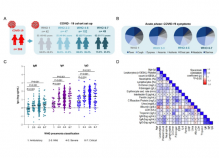Immunoglobulins in COVID-19 pneumonia: from the acute phase to the recovery phase
Open Access
Vasoula Skouridou, Maryluz Botero-Gallego and Ciara O’Sullivan have published in collaboration with researchers from the Hospital Universitari de Tarragona Joan XXIII, the Institut Investigació Sanitària Pere Virgili and the Centro de Investigación Biomédica en Red de Enfermedades Infecciosas the following article:
Immunoglobulins in COVID-19 pneumonia: from the acute phase to the recovery phase
European Journal of Medical Research, 29, 223 (2024)
Abstract
Background
COVID-19 pneumonia causes hyperinflammatory response that culminates in acute respiratory syndrome (ARDS) related to increased multiorgan dysfunction and mortality risk. Antiviral-neutralizing immunoglobulins production reflect the host humoral status and illness severity, and thus, immunoglobulin (Ig) circulating levels could be evidence of COVID-19 prognosis.
Methods
The relationship among circulating immunoglobulins (IgA, IgG, IgM) and COVID-19 pneumonia was evaluated using clinical information and blood samples in a COVID-19 cohort composed by 320 individuals recruited during the acute phase and followed up to 4 to 8 weeks (n = 252) from the Spanish first to fourth waves.
Results
COVID-19 pneumonia development depended on baseline Ig concentrations. Circulating IgA levels together with clinical features at acute phase was highly associated with COVID-19 pneumonia development. IgM was positively correlated with obesity (ρb = 0.156, P = 0.020), dyslipemia (ρb = 0.140, P = 0.029), COPD (ρb = 0.133, P = 0.037), cancer (ρb = 0.173, P = 0.007) and hypertension (ρb = 0.148, P = 0.020). Ig concentrations at recovery phase were related to COVID-19 treatments.
Conclusions
Our results provide valuable information on the dynamics of immunoglobulins upon SARS-CoV-2 infection or other similar viruses.

